Enfield's Town Council is apparently trying to kill a 70-unit housing project in Thompsonville that the Planning and Zoning Commission approved. The Council's behavior has been egregious and unprofessional in pursuit of that goal. It's doing this in secret and risking a lawsuit for murky reasons.
Impact Residential Development recently received PZC approval for this project in a 5-2 vote. It was a remarkable and courageous moment for the commission.
But the Town Council Republicans want to block it. They are designing in executive session a way to oppose it. They did not let the developer know of their plan until the last minute.
Here's the background
The developers plan to build this housing on and near the former Strand Theater site, land which the town had acquired. It combines primarily affordable housing and market-rate units with 70 parking spaces. It faced opposition over concerns about on-street parking.
The idea is that since this is a transit-oriented development district, a consequence of the planned Hartford-Springfield commuter rail, the number of parking spaces was in keeping with transit development schemes.
In approving this project, the PZC put the on-street parking concerns aside. PZC member Linda DeGray, who supported the project, said at the meeting: "I understand the parking issues, but I also understand that we have to move forward. We have to look to the future."
The best quote of the night of the PZC vote belongs to Patrick Tallarita, owner of the old Thompsonville firehouse at 11 Pearl. According to zoning records, he plans to create a beer and wine restaurant and spoke in favor of the project: "Sometimes progress needs to come before the solutions."
Does the Town Council know what it's doing?
The idea of a housing development moved ahead during the Democrats' term, but it confronted a problem with the Republicans once the project was changed.
You can see where the Council might have problems with the project. The developers originally proposed 123 units with 56 parking spaces and two retail spaces.
The limited parking scared the Council, and the developer downsized the project, resulting in the loss of retail. The Republicans criticized the decision to exclude retail. But the developer was also dealing with another problem. It was a question mark whether the retail was viable. The developers took a closer look at the retail vacancies in the immediate area and decided that residential units were more important at this stage of Thompsonville's development.
Mayor Nelson, an abutting property owner, was not happy with the loss of retail. He also argued that Thompsonville must address parking. But the PCZ saw it differently.
What experience teaches
New Britain Mayor Erin Stewart, a Republican in a highly Democrat city, is in her 6th term and has learned some things. (I was the city hall reporter for The Herald at an early part of my news career) That city has dealt with the tensions between commercial development versus housing and this is what she told
CT Insider:
"We learned you build housing first," Stewart said. "It was a risk that we took. It's a big risk because we were debating, 'Where do you put your resources?' Do you put your resources into retail or are we putting it into housing? I am so glad we put it into housing because feet on the street is going to drive the economy."
How does Stewart's point apply to Enfield?
Thompsonville's commercial district could be doing better, obviously, and those retail spaces the developer originally proposed may not yet be able to support retail at the needed rents, which goes back to Stewart's argument.
The PZC understood the tension over what comes first; as Stewart noted, it's between commercial development and housing. The PZC members didn't get hung up on the retail issue. Then PZC Chair Lewis Fiore said at the meeting, "You build the housing first, and then the economic development occurs."
Stepping back, the Council missed an opportunity to have a more significant number of units and an even greater impact on Thompsonville's future. It should have worked with Impact Residential to build as much housing as possible, even if that meant participation by the town to acquire more land to address parking. One imagines that may still be possible, but not if the Town Council sends a message that Impact Residential can't trust Enfield as a partner.
The Town Council's super-secret plan
The Town Council, unhappy with the PZC, meets in executive session at its last meeting to consider a resolution that may derail the project.
One shocking aspect is that they only told the developer at the last minute that they were considering a super secret plan to derail the project.
Impact Residential representative Peter Wood, appeared before the council during its public comment portion of the Jan. 22 meeting. He says this:
"We only found out about Union Square being on the agenda for this meeting today, earlier this afternoon. No one from the town notified Impact Residential of any action that might take place at this meeting."
Wood reminds the Town Council that the town's legal counsel reviewed the contract and he asks the Council to honor it.
Wood also clearly warns: "We will pursue full legal remedies available including damages should this be undermined."
The Council tabled its resolution, but that doesn't mean it's dead.
(I submitted a Freedom of Information Act request for the "Resolution Regarding the Union Square Development Project," as it appeared on the agenda. Since the Council tabled the resolution in open session, my argument was that the agenda was public. The town rejected that argument and said: "There was no resolution included with this agenda item," and that the matter was covered under executive session law and exempt from disclosure. I appreciated the town's quick response.)
What happens next will be bad for the council
If the Council goes ahead with whatever it's planning, it's a good bet it will face a lawsuit.
Impact Residential evidently has a contract with the town and hard-won PZC approval.
The PZC is an independent body, and the Council has an obligation to respect its decision and not try to disable it with some squirrely backdoor maneuver.
As part of any lawsuit, there is a process called "discovery," where the plaintiffs vacuum up every text message, email, and document. That ought to be interesting. Then, there are the hours council members will spend in depositions explaining all their convoluted reasons for trying to kill this project.
The town will probably need outside legal counsel, and the legal expenses will be significant. And if the town fails to win its case in court, it risks "damages," as Wood warned.
It's easy enough to imagine what's going on. The Council's actions are probably based on unprincipled political reasons, likely to come out sooner than later.
Whatever the reasons, the Council's actions were unprofessional and reckless. This is an embarrassment and potentially a major setback for Thompsonville. The Council should drop its opposition, move on, and work with this developer to see what other steps can be taken to bring Thompsonville's commercial district back to life and improve its housing.






Comments
Post a Comment